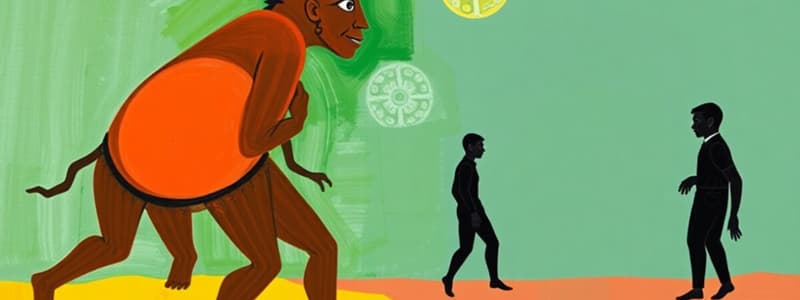Podcast
Questions and Answers
What is the primary focus of anthropology?
What is the primary focus of anthropology?
- The study of economic systems
- The development of political theory
- The mapping of geographical features
- The study of human behavior (correct)
Which of the following is a sub-discipline of cultural anthropology?
Which of the following is a sub-discipline of cultural anthropology?
- Physical Anthropology
- Economics
- Psychology
- Linguistics (correct)
What differentiates sociology from anthropology?
What differentiates sociology from anthropology?
- Sociology is primarily concerned with cultural norms
- Sociology focuses solely on human behavior
- Sociology excludes historical analysis
- Sociology studies interrelationships within society (correct)
Which stage is NOT part of the Theory of Positivism?
Which stage is NOT part of the Theory of Positivism?
What is a key characteristic of culture?
What is a key characteristic of culture?
What does applied anthropology focus on?
What does applied anthropology focus on?
Which of the following best describes the relationship between culture and society?
Which of the following best describes the relationship between culture and society?
Who is recognized as the 'Father of Sociology'?
Who is recognized as the 'Father of Sociology'?
Which area does psychology NOT primarily focus on?
Which area does psychology NOT primarily focus on?
Which discipline studies the distribution of physical environment features?
Which discipline studies the distribution of physical environment features?
Flashcards are hidden until you start studying
Study Notes
Social Science Overview
- Social Science encompasses disciplines that analyze society and culture, often referred to as the "Science of Society."
Anthropology
- Focuses on human behavior and is known as the complete "Science of Man."
- Characteristics include the study of human beings, utilization of the scientific process, explanations of human diversity, and a tendency to make generalizations.
- Divided into two main fields:
- Physical/Biological Anthropology: Examines physical features and diversity among humans, emphasizing biological and behavioral aspects.
- Cultural Anthropology: Studies culture within specific populations, including subfields such as Archeology (past cultures), Linguistics (language's role in social life), and Ethnology (human characteristics and interrelations).
- Applied Anthropology: Applies research methods and theories to address practical issues in society.
- Goals include discovering commonalities among people, generating new knowledge about humanity, understanding diversity, and fostering objective cultural self-assessment.
Sociology
- Investigates interrelationships within society, established by Auguste Comte, known as the "Father of Sociology."
- Employs the theory of Positivism, which posits that societal development progresses through three stages: Theological, Metaphysical, and Scientific.
- Aims to generalize social behaviors to better understand modern social life.
Political Science
- Examines political processes and behaviors, focusing on power dynamics within organizations.
- Represents the relationship between government and its citizens through political study.
Psychology
- Studies mental processes to explain how individuals think and act.
Economics
- Analyzes the production, distribution, and consumption of resources and services.
Geography
- Focuses on the spatial distribution of physical environment features.
Culture
- Derived from Latin "cult" and "cultus," meaning to till or cultivate; it is learned rather than inherited.
- Comprises beliefs, behaviors, objects, and characteristics shared by a group or society.
- Represents the essence of society, highlighting that a human being requires culture for true existence.
Society
- Involves the relationships among people and is characterized by organized groups sharing common living spaces while depending on one another for survival.
- Considered by sociologists and anthropologists as a reflection of cultural organization.
Connection Between Culture and Society
- Culture and society are interdependent concepts; understanding one requires referencing the other.
- Neither can exist independently, as culture shapes society and vice versa.
Studying That Suits You
Use AI to generate personalized quizzes and flashcards to suit your learning preferences.




